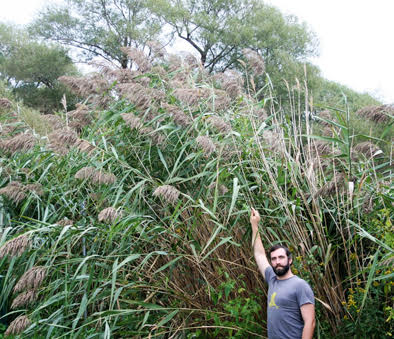Non-native phragmites have invaded White Bear Lake!

Photo source: Ontario Phragmites Working Group https://opwg.ca/
Invasive non-native phragmites were discovered growing on the edges of White Bear Lake in late August 2018. Non-native Phragmites, also known as common reed, is an extremely tall wetland grass. During the growing season it can reach over 15 feet tall and has dark green leaves with a large purple-brown flower head.
WBLCD contracted for treatment in late summer of 2019, with a follow-up application one year later, in 2020. The infestations appear to be under control, but we must remain vigilant to control their spread.
How to control non-native phragmites
Management of invasive aquatic plants involving either mechanical removal of plants or application of herbicides to public waters below the ordinary high water level (OHWL) requires a permit from the DNR. (For reference, the lake reached levels a few inches above the OHWL in 2019 and 2020.) If non-native phragmites are growing outside public waters on private land, they may be controlled by property owners (see U of M information on controlling phragmites, below).
Minnesota DNR information on Invasive Phragmites: https://www.dnr.state.mn.us/invasives/aquaticplants/phragmites/index.html
University of Minnesota information on Invasive Phragmites: https://www.maisrc.umn.edu/phragmites
This web page includes detailed information on how to identify and control invasive phragmite.
